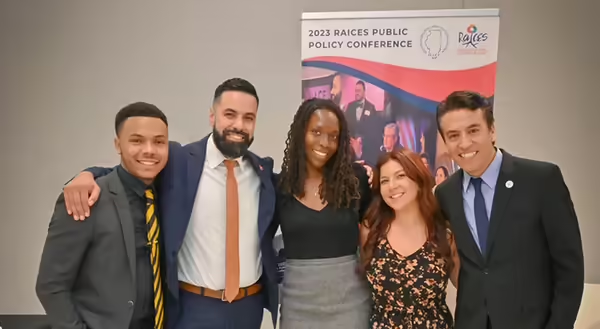
As an ISPP Scholar, Drake Materre is appointed with the Illinois Legislative Latino Caucus / Latino Caucus Foundation. His work is significant as he focuses on improving the lives of those who are historically underserved and underrepresented, especially in the area of workers' rights and health and occupational equity. Drake shared some thoughts with me about the ISP program, and his work so far.
Why did you apply for the Illini Science Policy Program?
As an avid grassroots community organizer, I was always critical of working at the policy level because of its disconnect with the community. And while it is necessary to be critical, my critique comes from being inexperienced at the policy level. I believed that by applying to the program I would be able to gain the necessary policy experience and bridge it with my grassroots organizing thus ensuring a greater impact.
Tell us a bit about what you hope to accomplish as a result of being a 2024 Scholar.
Before being a scholar, I never conducted research as an undergraduate or graduate student. I am excited to conduct research on areas that interest me and I hope that it can be instrumental.
Tell us a bit about what you are working on for your host agency.
I work with the Illinois Legislative Latino Caucus Foundation’s policy program under the guidance of Policy Manager, Kimberly Fair. I have worked on the foundation’s annual Raices conference spearheading the volunteer program for the conference and handling attendance logistics. I have helped create our strategic plan and our public policy framework which will guide the policy program throughout the year through three distinct phases. I have done some grant writing too and helped establish communications between the ILLCF and philanthropic foundations for the purpose of collaboration and financial support. Much thanks is given to Executive Director Oswaldo Alvarez, Policy Manager Kimberly Fair, and our Chief of Staff Elizabeth Gutierrez who helped build the foundation while serving as the 2023 scholar for the ISPP.
Tell us a bit about what you are working with your Extension Mentor (or what you will be doing)?
I am very interested in workers rights, unionizing and occupational health. Working under Dr. Margarita Teran-Garcia, I am conducting research on 2nd and 3rd generation Latino line cooks to find a correlation between work alienation and psychological distress. I will utilize scales to conduct the correlational analysis and will conduct focus groups to establish a more nuanced analysis of the participants’ work experience and their mental health. Utilizing this research, I hope to make policy recommendations related to workers rights and unionization, develop training to produce managerial leadership styles that reduce work alienation, and increase outreach to restaurant workers through labor centers and other institutions.
What does being in public service mean to you?
Public service does not start nor stop at the policy level. Public service is not relegated to any specific type of work. To work in public service means to be a servant of the people, to serve the people in any capacity that fits best. One does not engage in public service for the purpose of self-aggrandizement but only for the uplift and betterment of the people.
What makes the work you are doing as an ISPP Scholar meaningful to you?
I am very interested in workers rights and occupational health. Specifically, I am interested in utilizing Marx’s theory of alienation not only to better understand social inequities and its health implications for various populations but also because of the somewhat “intellectual McCarthyism'' exhibited in academia toward Marxism. This work is meaningful to me because of the current wave of labor organizing throughout the US. Most importantly, I believe I can work within academia and play a role in developing the literature that supports labor organizing while building the bridge between public health and labor unions. Historically, labor unions have served as vanguards in the struggle for increased wages, health insurance, and better working conditions which, according to the social determinants of health, increased overall health outcomes. I believe I can play a role in the struggle for health equity through the advocacy for workers and workers rights at the policy level and at the grassroots level.
What is one thing that you have learned since becoming an ISPP Scholar that has made an impression on your transition from graduate student to career individual?
I have learned to juggle multiple tasks at once right when they are given.
Why is/are the issue(s) important to the communities with which you are working?
Workers make the world turn. Workers make the system operate. Every worker experiences a certain degree of alienation, however it is essential to understand how feelings of self-estrangement affect the mental health of workers. Specifically, how do the
Who is impacted by the issue(s) you are working on?
The Illinois Latino community and other marginalized communities are impacted by this work as every individual experiences work alienation.
What is the most unexpected thing about this program so far?
The most unexpected thing thus far is learning how to strategically plan for an organization and how to utilize connections and resources effectively.
If you could do one thing through this program and think “Wow, I did that,” what would you like it to be?
I would love to see the three phase framework of the policy program continue to be operationalized and sustained.
Anything else you’d like to share?
In the words of the Great Dr. Kwame Nkrumah, “Forward ever, backward never!”
More information about the Illini Science Policy Program is available on our website. Keep reading to learn more about Drake's colleagues in the of 2024 ISPP Scholar Class.